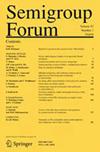一些无爱音节变体
IF 0.7
3区 数学
Q2 MATHEMATICS
引用次数: 0
摘要
摘要 我们研究了一些 nil-ai-semiring varieties。我们为所有交换平半音生成的 \(\textbf{FC}\) 中的自由客体建立了一个模型。同时,我们还提供了有限ai-semiring是非无限基础的两个充分条件。因此,我们证明了有限 nil semigroup \({\dot{S}}_{c}(W)}\) 的 power semiring \(P_{\scriptstyle {\dot{S}}_{c}(W)}\) 是非无限基于的、其中,W 是字母表 X 上自由交换半群 \(X_{c}^{+}\)中单词的有限集合,只要 W 中单词长度的最大值是 \(k\ge 3\),并且 W 不包含字母的第 k 次幂。这部分回答了杰克逊等人提出的一个问题(J Algebr 611: 211-245, 2022)。本文章由计算机程序翻译,如有差异,请以英文原文为准。
Some nil-ai-semiring varieties
Abstract
We study some nil-ai-semiring varieties. We establish a model for the free object in the variety \(\textbf{FC}\) generated by all commutative flat semirings. Also, we provide two sufficient conditions under which a finite ai-semiring is nonfinitely based. As a consequence, we show that the power semiring \(P_{\scriptstyle {\dot{S}}_{c}(W)}\) of the finite nil-semigroup \({\dot{S}}_{c}(W)\) is nonfinitely based, where W is a finite set of words in the free commutative semigroup \(X_{c}^{+}\) over an alphabet X, whenever the maximum of lengths of words in W is \(k\ge 3\) and W does not contain the kth power of a letter. This partially answers a problem raised by Jackson et al. (J Algebr 611: 211–245, 2022).
求助全文
通过发布文献求助,成功后即可免费获取论文全文。
去求助
来源期刊

Semigroup Forum
数学-数学
CiteScore
1.50
自引率
14.30%
发文量
79
审稿时长
12 months
期刊介绍:
Semigroup Forum is a platform for speedy and efficient transmission of information on current research in semigroup theory.
Scope: Algebraic semigroups, topological semigroups, partially ordered semigroups, semigroups of measures and harmonic analysis on semigroups, numerical semigroups, transformation semigroups, semigroups of operators, and applications of semigroup theory to other disciplines such as ring theory, category theory, automata, logic, etc.
Languages: English (preferred), French, German, Russian.
Survey Articles: Expository, such as a symposium lecture. Of any length. May include original work, but should present the nonspecialist with a reasonably elementary and self-contained account of the fundamental parts of the subject.
Research Articles: Will be subject to the usual refereeing procedure.
Research Announcements: Description, limited to eight pages, of new results, mostly without proofs, of full length papers appearing elsewhere. The announcement must be accompanied by a copy of the unabridged version.
Short Notes: (Maximum 4 pages) Worthy of the readers'' attention, such as new proofs, significant generalizations of known facts, comments on unsolved problems, historical remarks, etc.
Research Problems: Unsolved research problems.
Announcements: Of conferences, seminars, and symposia on Semigroup Theory.
Abstracts and Bibliographical Items: Abstracts in English, limited to one page, of completed work are solicited.
Listings of books, papers, and lecture notes previously published elsewhere and, above all, of new papers for which preprints are available are solicited from all authors.
Abstracts for Reviewing Journals: Authors are invited to provide with their manuscript informally a one-page abstract of their contribution with key words and phrases and with subject matter classification. This material will be forwarded to Zentralblatt für Mathematik.
 求助内容:
求助内容: 应助结果提醒方式:
应助结果提醒方式:


